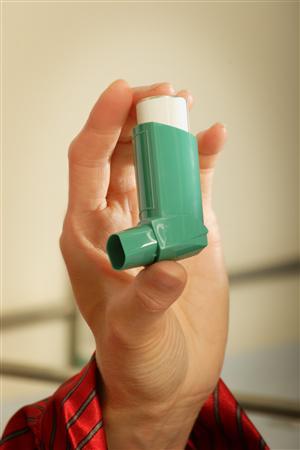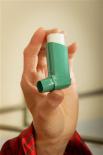
Inhalers may raise risk of asthma in some children
Common asthma reliever drugs taken by millions of children around the world may increase the risk of asthma attacks in some patients with a particular genetic make-up, British scientists said on Tuesday.
The researchers found that salbutamol, a popular blue inhaler medicine also known as Ventolin, as well as salmeterol, an ingredient in GlaxoSmithKline’s Advair, are less effective in children with a specific gene variant and may in some cases make their asthma worse.
The scientists said their findings suggest that carrying out genetic tests on children before treatment could be a more cost-effective way of treating them.
“This is a global question that needs to be addressed,” said Somnath Mukhopadhyay of Brighton and Sussex Medical School.
Salbutamol is called albuterol in the United States and is very widely used, the researchers told a news conference.
U.S. drug regulators have cautioned in the past that asthma drugs like Advair and Serevent, also made by Glaxo, may actually increase asthma risk in some patients. Glaxo said in a statement it had carried out its own studies with Advair and Serevent and found no genetic variation response differences, although the 500 patients in its study were older than 12.
“Albuterol is one of the commonest drugs right across the world. It is used in the United States, in Africa, India…” said Mukhopadhyay. “It’s cheap, it’s popular, and it’s good stuff — when it works.”
Asthma affects more than 300 million people worldwide and is the most common children’s chronic illness. Symptoms include wheezing, shortness of breath, coughing and chest tightness.
asthma, asthma Health, asthma Health Latest, asthma Health Information, asthma Health information, asthma Health Photo,asthmafor Weight Health photo, asthma Health Latest, asthma Health latest, Choreography for Weight Health Story, asthma Video, asthmavideo, asthma Health History, asthma Health history, asthmaover Picture, history, asthma Asia, asthma asia, asthma Gallery, asthma for Weight gallery, asthma Photo Gallery, asthma Picture, asthma picture, asthma Web, Malaysia Health, web Health, web Health picture, video photo, video surgery, gallery, laparoscopy, virus, flu, drug, video, Health Health, calories, photo, nutrition, health video, symptoms, cancer, medical, beating, diet, physical, Training, organic, gym, blister, exercise, weightloss, surgery, spiritual, eating, tips, skin, operation, bf1,




